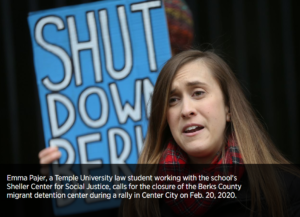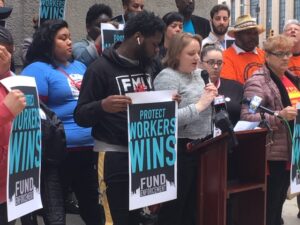As the pandemic disrupts employment, subcontracted workers are especially vulnerable. Prof. Jennifer Lee discusses the problem in an Inquirer article today.
 About Isaac Christopher Samuel
About Isaac Christopher Samuel
Sheller Center Files Lawsuit about Family Detention in Berks County
The Sheller Center has filed a lawsuit against Pennsylvania Department of Human Services (DHS) claiming that it has unlawfully agreed to the continued operation of the family detention facility in Berks County. These agreements amount to an end run around the legal process for issuing a license that DHS must follow under Pennsylvania law for licensing facilities that hold children.
 Emma Pajer (’20), who helped to draft the lawsuit, spoke at a press conference about the detention center. She told the gathered crowd yesterday, “[t]his lawsuit serves as a message that we won’t let DHS get away with not doing their job and ignoring their fundamental mission.”
Emma Pajer (’20), who helped to draft the lawsuit, spoke at a press conference about the detention center. She told the gathered crowd yesterday, “[t]his lawsuit serves as a message that we won’t let DHS get away with not doing their job and ignoring their fundamental mission.”
While DHS initially denied Berks County’s license in 2016, that license has been tied up in an ongoing litigation battle for four years. Under Pennsylvania law, children cannot be held in a secure detention facility if they are under the age of nine or have not been alleged or adjudicated delinquent. By detaining migrant children – including children as young as three months old – the Berks County facility is operating in violation of Pennsylvania law.
In the meantime, Berks County applied for new licenses for 2017-2018, and 2018-2019. Instead of denying these licenses, DHS has simply stipulated to allow the facility to continue to operate under its 2016-2017 license. DHS’ actions have resulted in permitting Berks County to keep immigrant children locked in a facility, which the American Academy of Pediatrics states can cause psychological trauma and long-term mental health risks for children.
Co-counsel for the lawsuit includes Free Migration Project, Karen Hoffman (‘16), Carol Anne Donohoe (‘10), and ALDEA – The People’s Justice Center.
Judge Cites Sheller Report Granting Motion to Suppress and Terminate Immigration Proceedings
An Immigration Judge recently granted an immigrant’s motion to suppress and terminate proceedings after a local police officer made a basic traffic stop and then called ICE. The court found that while the initial stop was lawful, the extension of the stop to interrogate the individual about their immigration status and to contact ICE violated the Fourth Amendment. It found that such violations were widespread based on a recently released report from the Sheller Center, called Interlocking Systems: How Pennsylvania Counties and Local Police Are Assisting ICE to Deport Immigrants. The court stated that that the report “allows the Court to reconsider its previous findings by demonstrating ICE’s concerted effort to encourage local law enforcement’s unconstitutional collaboration.” Considering this landscape, the Court found that the officer’s acts fit into a widespread pattern of misconduct.
Improving Enforcement of Worker Protection Laws
Today the Sheller Center released Enforcing Wins by Philly Workers: Transforming Laws on Paper into Real Change. The report focuses on how Philadelphia can make its worker protection laws more effective by improving their implementation and enforcement. The authors are Ryan Dickinson (‘21), Maria DiGeorge (‘21), and Kelly McGuire (‘20).
Over the course of the semester, the authors analyzed survey data from Philadelphia workers, collected by One Pennsylvania and Make the Road Pennsylvania, about their experiences with wage theft, sick leave, and work schedules. Further, they looked at what other cities are doing to more effectively enforce their worker protection laws. Philadelphia so far has fallen short of using its laws to protect workers, by failing to inform workers about their rights, help workers file complaints, and issue penalties against violating employers. The report recommends a series of changes, such as increasing staffing and funding, creating robust community partnerships, and engaging in the affirmative enforcement of worker protection laws.
Sheller Center grad to head DA’s worker protection unit
Danielle Newsome, Temple LS ’15, was among the first students to participate in the Sheller Center’s programs. Now, she’s in charge of a brand-new unit in the Philly DA’s office that will focus on protecting the rights of Philly workers. You can read about the new unit, and Danielle’s impressive public-interest background, here. Congratulations Danielle!
Center launches Access to Justice Clinic
What’s an important aspect of our legal system that law students typically don’t learn about? Here’s one: the fact that vast numbers of Americans deal with their civil legal problems without help from lawyers. In landlord-tenant matters, in family court, in consumer and benefits cases, and in many other critical situations, Americans now mostly go it alone.
This reality contrasts sharply with the world of the law school casebook, in which no one, it seems, goes through a legal process without a knowledgeable attorney at their side. For many reasons — including high fees, the shortage of legal aid and pro bono help, the increasing complexity of laws and procedures, and more – that’s just not how our system actually works these days.
Enter the civil “access to justice” movement, which seeks to ensure that America’s justice systems work for everyone – not just those with high incomes. And enter the Sheller Center’s Access to Justice Clinic, launched this fall. In this clinic, six students are engaging in hands-on projects addressing access-to-justice problems in Philly. One project concerns the difficulty that unrepresented Philadelphians have in getting even a simple divorce. Another involves the high number of default judgments in landlord-tenant court, which result in evictions without the court ever hearing the (typically unrepresented) tenant’s side of the story.
It’s too early to say where the students’ work will lead, but the Clinic is off to a good start. The new clinic is just our most recent attempt, by the way, to engage students in improving access to justice in Pennsylvania (see our work on fair treatment for non-native speakers of English in court proceedings for another example). We hope you’ll check back as the year progresses to learn more about our Access to Justice Clinic and other projects.
Ending the detention of migrant children in Pennsylvania
Detention is no place for migrant children. In Berks County, Pennsylvania houses one of three family detention facilities in the country. While Governor Wolf states that he finds such detention “inhumane,” he claims he cannot do anything about it. Professor Jennifer Lee’s Op-Ed in today’s Philadelphia Inquirer details why this claim is untrue. Since 2015, students in the Social Justice Lawyering Clinic have been working with the Shut Down Berks Coalition to bring attention to the facility and argue for its closure.
Popular anti-wage theft strategies may not be effective
A newly released study conducted by Prof. Jennifer Lee and co-author Prof. Annie Smith compiled 141 state and local anti-wage theft laws enacted over roughly the past decade. In reviewing these laws, they found that the most popular anti-wage theft strategies involve authorizing worker complaints, creating or enhancing penalties, or mandating employers to disclose information to workers about their wage-related rights. Lessons learned about these regulatory strategies in other contexts, however, raise serious questions about whether these state and local laws can be successful. At the same time, they identified more promising regulatory innovations, such as new collaborative approaches to enhance agency enforcement.
Given the hostility to low-wage worker rights at the federal level, this study hopefully informs advocacy groups and policymakers that are attempting to address the pernicious practice of wage theft at the state and local level. A review of the study by Prof. Sachin Pandya can be found in Jotwell. Additional data from the study can also be accessed here.
Asking city council to fund enforcement to protect workers
Philadelphia has legal protections for low-wage workers on the books, including paid sick leave and an ordinance to address wage theft. The problem, however, is that these legal protections for low wage workers do not amount to much if they are not actually enforced. Representing the Sheller Center, Lily Austin (’20) spoke at a press conference at city hall about the need for sufficient funding, particularly to educate workers and employers about these laws. She explained how the city cannot sit back and wait for complaints to come. Rather, the city needs to work in active partnership with community groups, who already have the trust of these workers, by providing sub-grants to community-based organizations to educate low-wage workers. It must also work cooperatively with communities to proactively target employers or industries who are likely to be violating the laws.

Philadelphia Sheriff moves to halt ICE arrests at city courthouses
According to the Philadelphia Inquirer, the Philadelphia Sheriff has reached an agreement with ICE to stop arrests of immigrants in courthouses in Philadelphia. The Sheriff has the responsibility to provide safety and security for courthouses. This agreement also requires that ICE agents identify themselves upon entering the courthouse, declare whether they are armed, and state where in the building they intend to go. The Sheriff’s Deputies will alert their supervisors, who will contact the presiding judge.
The new policy is consistent with some of the recommendations in the Sheller Center’s Report, Obstructing Justice. In the report, law students amassed information about the devastating impact that ICE arrests are having on immigrant communities, making victims, witnesses, and defendants fearful to access the courts. Since the report was released, there have been several local and national stories about the continued impact of ICE arrests on such communities.
